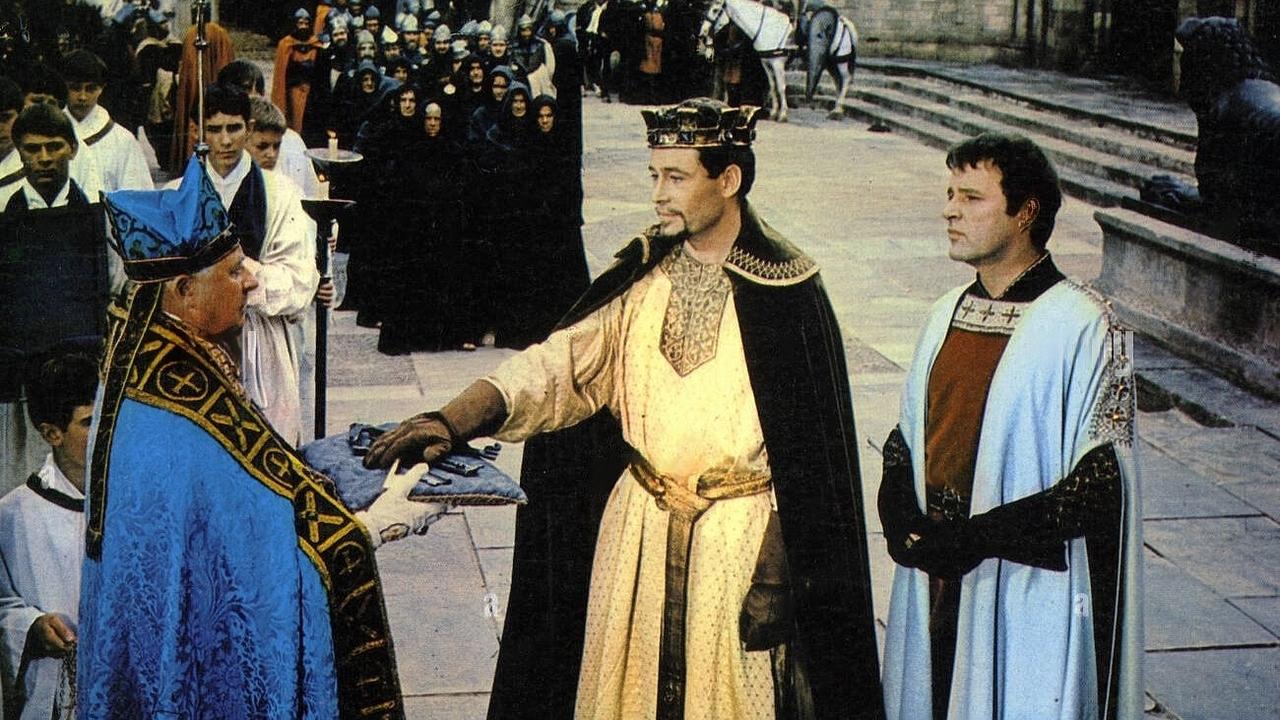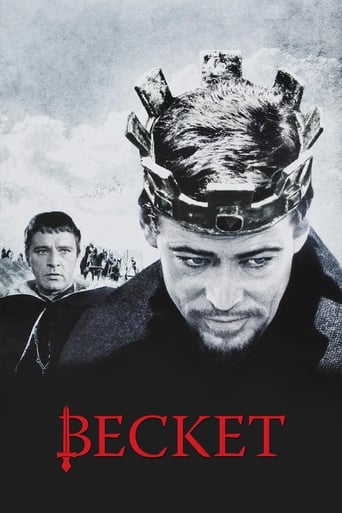

This movie showing its age after 800 years. Visually, it's completely static and claustrophobic. The script is densely wordy, yet no one on this thread has identified any quotable lines. In terms of plot and story arc, it plays as if Stanley Kramer did the middle ages, with a lot of anachronistic business about ethnic/class differences, separation of church and state, and the corruptions of power. Despite the set piece tension between the supposedly Saxon Becket and the Norman Richard, it turns out that the real, historical Becket, too was a Norman. Never mind!As for the acting, get ready for some of the most egregious scenery chewing in Hollywood history. Peter O'Toole is particularly guilty of a when-in-doubt-shout performance. When he gazes guiltily up to heavens, he clearly must be thinking of the soul destroying self betrayals required to win an Oscar. I'm sure that's the hidden meaning behind the penance scenes.
... View MoreThis movie definitely has some positive attributes, but also some annoying flaws. It is visually enjoyable, with very nice cinematography and superb costume design. And there is some fine acting, especially by Richard Burton, as well as John Gielgud. But there are many historical inaccuracies, most of them entirely unnecessary to the story. For example, Henry may have been harsh with his sons and with his wife, but was kind to his mother Matilda, who had always been very loving and devoted to him. The lack of respect between the two added nothing to the movie. Thomas Becket was not a Saxon, he was born in London but was the son of a couple from Normandy. Henry was less Norman than Becket, he was the son of an Angevin father, and his mother was a mix of Norman, Scottish, and Anglo-Saxon royalty. Her grandparents were William I, Matilda of Flanders, Margaret of Wessex (a descendant of Alfred the Great, she became St Margaret of Scotland), and Malcolm Canmore, King of Scotland. So Henry II had more Anglo-Saxon heritage (1/8) than Thomas Becket (none).The conflict between Henry and Becket actually went on for years, and there were many differences between them, not just the decision to execute a priest.Henry was almost certainly not a homosexual. He considered Becket a good friend and supporter at one time, but the movie makes him out to be madly in love with Becket while having no liking or respect for anyone else. The actress who played Eleanor of Aquitaine was nothing like her. In reality, Eleanor was an elegant and exceptionally strong woman. The makers of The Lion in Winter made a wiser choice by casting Katharine Hepburn.
... View MoreBecket is a man's movie. I don't think there are any women in the cast, or if there are, they have very insignificant parts. My brother, who has been known to tolerate rather than enjoy old movies, loved this movie. Whenever he talks about the classic film genre, he says, "You know what movie I liked? Becket!" The only bad part of the movie is what happened during the 1965 awards season. Richard Burton and Peter O'Toole were repeatedly pitted against each other in the Best Actor category. If only tied awards were more prevalent. Both men were nominated for the 1965 Oscar, and Rex Harrison ran away with the gold for his bored, flippant, tired, lousy performance in My Fair Lady. If that doesn't make you lose faith in the Academy, just wait two more years for Richard Burton to once again lose the gold in Who's Afraid of Virginia Woolf? to Paul Scofield in A Man for All Seasons. Just terrible.Anyway, back to Becket. If you like Richard Burton or Peter O'Toole, you need to watch it. Their performances are fantastic beyond description; you could watch it ten times and still come out with a tie as to who gave a better performance. Pete plays King Henry II, and Dick plays Becket. The king and the archbishop differ in their core beliefs, but will religion get in the way of their friendship? Will Becket compromise his morals to stay a loyal friend to the king? The historical friendship between the two real life figures is written out thoughtfully and rivetingly, even though the story was originally based off a play. Yes, it's wordy, but none of the speeches are wasteful or boring. It's incredibly thought-provoking, constantly pulling the audience both ways. Both characters are likable and both sides of the debate are understandable. And since the actors were famous friends offscreen, it's that much more enjoyable to watch them verbally spar with each other on screen. It's a true masterpiece.
... View MoreThis slow-paced film explores the love-hate relationship between a young, hedonistic King Henry II (Peter O'Toole) and his brooding, philosophical friend Thomas Becket (Richard Burton). The casting seems perfect, but O'Toole is often caught chewing the scenery and there is surprisingly little chemistry between he and Burton. Both of these actors are rightly associated with challenging and multifaceted roles, usually of flawed, frustrated antiheroes who embrace but undermine traditional notions of masculinity. That is precisely what the script of "Becket" aims for, but here the dialogue is overwrought and belabored, and the characterizations are one-dimensional. O'Toole would reprise the character of Henry II to much greater effect in "The Lion in Winter" (1968), which features a more forceful script and better performances.
... View More